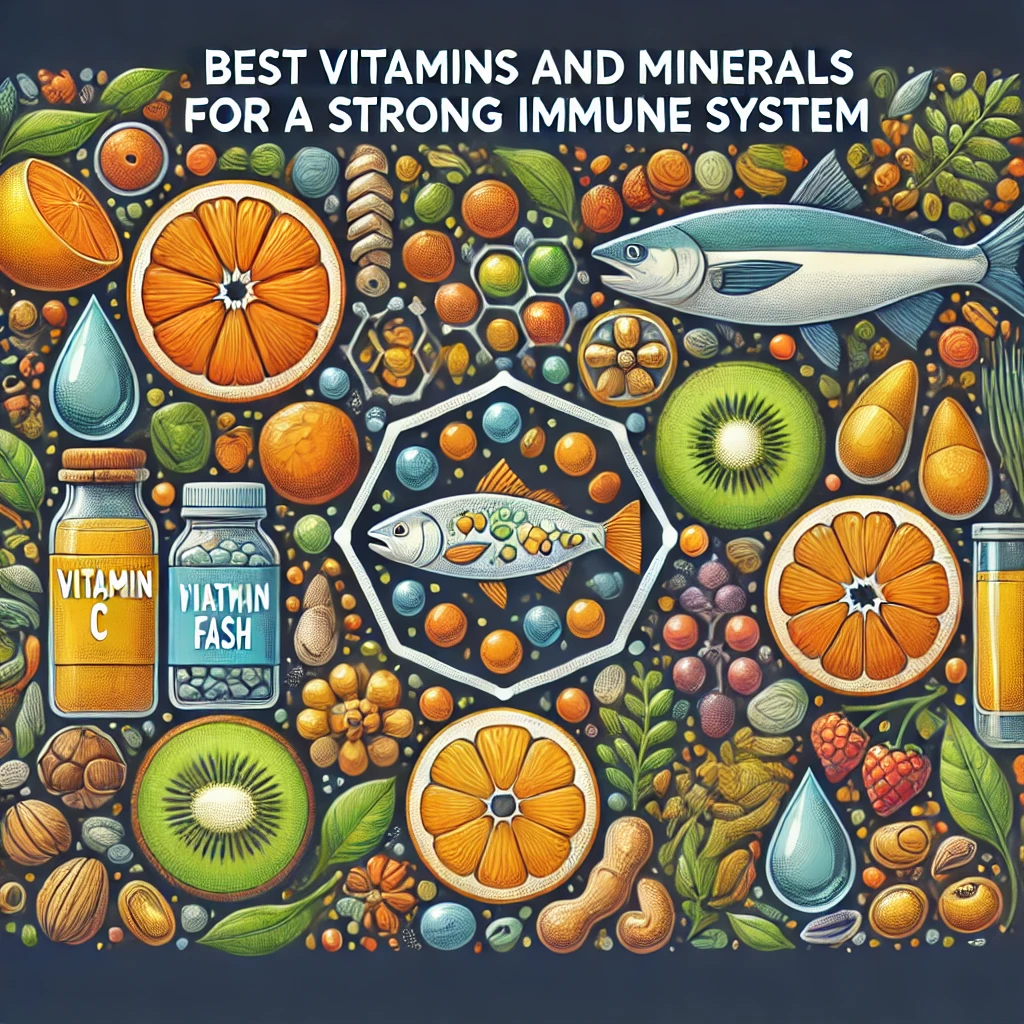Introduction
A strong immune system is essential for protecting the body from infections, reducing inflammation, and maintaining overall health. While many factors influence immunity, proper nutrition is one of the most important.
Vitamins and minerals play a crucial role in immune function by supporting white blood cell production, reducing oxidative stress, and enhancing the body’s ability to fight infections.
But which nutrients are the most important, and how can you ensure you’re getting enough of them?
What You’ll Learn in This Article
✅ The top vitamins and minerals for immune support.
✅ Their functions in the body and how they fight infections.
✅ The best food sources for each nutrient.
✅ Practical tips to incorporate them into your daily diet.
Let’s dive into the science-backed nutrients that help boost immunity naturally!
1. Vitamin C: The Infection Shield
Vitamin C is one of the most well-known immune boosters. It stimulates white blood cell production, enhances antibody function, and acts as a powerful antioxidant to neutralize free radicals.
🔹 Immune Benefits of Vitamin C:
✔ Increases white blood cell activity, helping the body fight infections.
✔ Accelerates recovery from colds and flu.
✔ Reduces oxidative stress, which weakens immune function.
🔹 Best Food Sources of Vitamin C:
🍊 Citrus fruits (oranges, lemons, grapefruits)
🍓 Berries (strawberries, acerola, blueberries)
🌶 Red bell peppers (contain more vitamin C than oranges!)
🥦 Broccoli & leafy greens
🔹 How to Consume:
✔ Eat fresh fruits daily or drink vitamin C-rich juices to boost immunity.
2. Vitamin D: The Natural Immune Booster
Vitamin D is critical for immunity, as it helps the body produce antimicrobial proteins that fight infections. Deficiency has been linked to higher risks of respiratory infections, including colds, flu, and pneumonia.
🔹 Immune Benefits of Vitamin D:
✔ Enhances T-cell function, which fights infections.
✔ Reduces chronic inflammation, preventing autoimmune diseases.
✔ Strengthens lung health and reduces the risk of respiratory illnesses.
🔹 Best Food Sources of Vitamin D:
☀️ Sunlight exposure (10–30 minutes daily)
🐟 Fatty fish (salmon, sardines, tuna)
🥚 Egg yolks
🥛 Fortified dairy & plant-based milks
🔹 How to Consume:
✔ Aim for 15–20 minutes of direct sunlight daily or include fatty fish in meals.
3. Zinc: The Protector of Immune Cells
Zinc is essential for white blood cell production, helping the body fight off viruses and bacteria. It also supports wound healing and prevents inflammation-related immune suppression.
🔹 Immune Benefits of Zinc:
✔ Strengthens white blood cell function against infections.
✔ Enhances antibody response after vaccination.
✔ Helps repair tissues and speeds up healing.
🔹 Best Food Sources of Zinc:
🦪 Oysters (highest natural source of zinc)
🥩 Red meat (beef, lamb)
🌰 Pumpkin seeds & nuts
🍛 Legumes (chickpeas, lentils, beans)
🔹 How to Consume:
✔ Eat zinc-rich foods daily or take supplements during cold & flu season.
4. Iron: The Oxygen Carrier
Iron helps produce hemoglobin, the protein that carries oxygen to immune cells. A deficiency can weaken immunity, making infections more frequent.
🔹 Immune Benefits of Iron:
✔ Supports oxygen transport, keeping immune cells energized.
✔ Boosts immune response and antibody production.
✔ Prevents anemia-related fatigue that weakens the body.
🔹 Best Food Sources of Iron:
🥩 Red meat & liver
🌱 Dark leafy greens (spinach, kale)
🍛 Lentils & beans
🍊 Pair with vitamin C foods (to enhance absorption)
🔹 How to Consume:
✔ Combine iron-rich foods with vitamin C (like spinach & orange juice) to increase absorption.
5. Selenium: The Powerful Antioxidant
Selenium is a trace mineral that helps reduce inflammation, improve immune cell function, and protect against viral infections.
🔹 Immune Benefits of Selenium:
✔ Enhances antibody production, increasing resistance to infections.
✔ Reduces oxidative stress, which damages immune cells.
✔ Supports thyroid function, which influences immunity.
🔹 Best Food Sources of Selenium:
🌰 Brazil nuts (just one nut per day meets daily needs!)
🐟 Seafood (tuna, shrimp)
🥚 Eggs
🍄 Mushrooms
🔹 How to Consume:
✔ Eat one Brazil nut daily or add eggs & mushrooms to meals.
6. Vitamin A: The Defense Against Infections
Vitamin A helps maintain mucosal barriers in the respiratory tract and improves white blood cell function.
🔹 Immune Benefits of Vitamin A:
✔ Strengthens skin & mucous membranes, the body’s first defense against infections.
✔ Enhances T-cell production, essential for immune response.
✔ Supports gut health, which is directly linked to immunity.
🔹 Best Food Sources of Vitamin A:
🥕 Carrots & sweet potatoes
🎃 Pumpkin
🥬 Spinach & kale
🐟 Liver (richest source of vitamin A)
🔹 How to Consume:
✔ Eat orange & green vegetables daily to boost immunity.
7. Omega-3: The Natural Anti-Inflammatory
Omega-3 fatty acids help reduce chronic inflammation, improving immune function.
🔹 Immune Benefits of Omega-3:
✔ Lowers inflammatory responses that weaken immunity.
✔ Enhances white blood cell function.
✔ Protects against autoimmune disorders.
🔹 Best Food Sources of Omega-3:
🐟 Fatty fish (salmon, sardines, mackerel)
🌰 Chia seeds & flaxseeds
🥜 Walnuts
🔹 How to Consume:
✔ Eat fatty fish twice a week and add flaxseeds to smoothies or oatmeal.
Final Thoughts: A Nutrient-Rich Diet is Key to Strong Immunity
To maintain a strong immune system, it’s crucial to get enough vitamins and minerals through a balanced diet.
Here’s what to remember:
✔ Eat a variety of nutrient-dense foods daily.
✔ Combine key nutrients (e.g., iron & vitamin C for better absorption).
✔ Get natural sunlight for vitamin D.
✔ Supplement wisely if you have deficiencies (consult a doctor first).
💡 Which of these nutrients will you prioritize in your diet? Let us know in the comments below! 🚀💪
